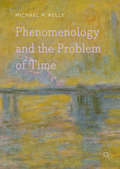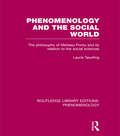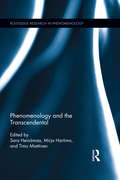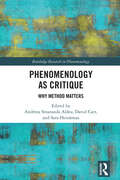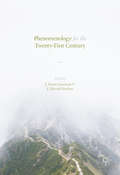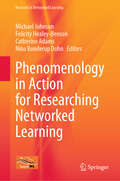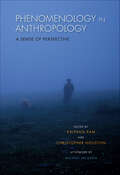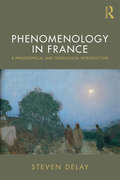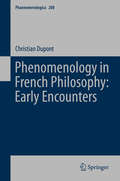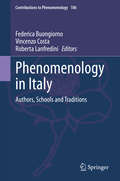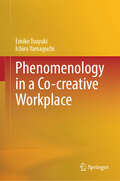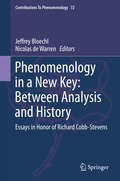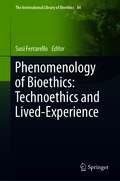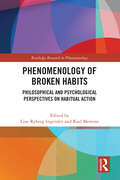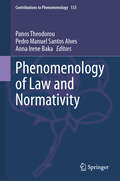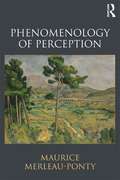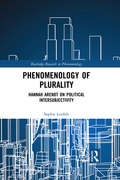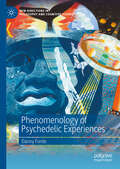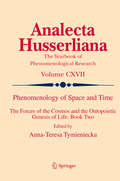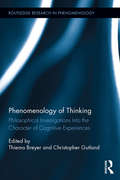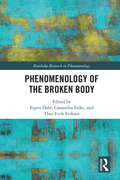- Table View
- List View
Phenomenology and the Problem of Time
by Michael R. KellyThis book explores the problem of time and immanence for phenomenology in the work of Edmund Husserl, Martin Heidegger, Maurice Merleau-Ponty, and Jacques Derrida. It provides an in-depth analysis of phenomenology's central notions of intentionality, immanence, and temporality, suggesting a new perspective on themes central to phenomenology and its development as a movement. The author raises for debate the question of where phenomenology begins and ends. Detailed readings of immanence in light of the more familiar problems of time-consciousness and temporality provide the framework for evaluating both Husserl's efforts to break free of modern philosophy's notions of immanence, and the influence Heidegger's criticism of Husserl exercised over Merleau-Ponty's and Derrida's alternatives to Husserl's phenomenology.
Phenomenology and the Social World: The Philosophy of Merleau-Ponty and its Relation to the Social Sciences (Routledge Library Editions: Phenomenology)
by Laurie SpurlingThe term ‘phenomenology’ has become almost as over-used and emptied of meaning as that other word from Continental Philosophy, namely ‘existentialism’. Yet Husserl, who first put forward the phenomenological method, considered it a rigorous alternative to positivism, and in the hands of Merleau-Ponty, a disciple of Husserl in France, phenomenology became a way of gaining a disciplined and coherent perspective on the world in which we live. When this study originally published in 1977 there were only a few books in English on Merleau-Ponty’s philosophy. It introduced the reader and suggested how his thought might throw light on some of the assumptions and presuppositions of certain contemporary forms of Anglo-Saxon philosophy and social science. It also demonstrates how phenomenology seeks to unite philosophy and social science, rather than define them as mutually exclusive domains of knowledge.
Phenomenology and the Transcendental (Routledge Research in Phenomenology)
by Mirja Hartimo Sara Heinämaa Timo MiettinenThe aim of this volume is to offer an updated account of the transcendental character of phenomenology. The main question concerns the sense and relevance of transcendental philosophy today: What can such philosophy contribute to contemporary inquiries and debates after the many reasoned attacks against its idealistic, aprioristic, absolutist and universalistic tendencies—voiced most vigorously by late 20th century postmodern thinkers—as well as attacks against its apparently circular arguments and suspicious metaphysics launched by many analytic philosophers? Contributors also aim to clarify the relations of transcendental phenomenology to other post-Kantian philosophies, most importantly to pragmatism and Wittgenstein’s philosophical investigations. Finally, the volume offers a set of reflections on the meaning of post-transcendental phenomenology.
Phenomenology as Critique: Why Method Matters (Routledge Research in Phenomenology)
by David Carr Sara Heinämaa Andreea Smaranda AldeaDrawing on classical Husserlian resources as well as existentialist and hermeneutical approaches, this book argues that critique is largely a question of method. It demonstrates that phenomenological discussions of acute social and political problems draw from a rich tradition of radically critical investigations in epistemology, social ontology, political theory, and ethics. The contributions show that contemporary phenomenological investigations of various forms of oppression and domination develop new critical-analytical tools that complement those of competing theoretical approaches, such as analytics of power, critical theory, and liberal philosophy of justice. More specifically, the chapters pay close attention to the following methodological themes: the conditions for the possibility of phenomenology as critique; critique as radical reflection and free thinking; eidetic analysis and reflection of transcendental facticity and contingency of the self, of others, of the world; phenomenology and immanent critique; the self-reflective dimensions of phenomenology; and phenomenological analysis and self- and world-transformation. All in all, the book explicates the multiple critical resources phenomenology has to offer, precisely in virtue of its distinctive methods and methodological commitments, and thus shows its power in tackling timely issues of social injustice. Phenomenology as Critique will appeal to researchers and advanced students working in phenomenology, Continental philosophy, and critical theory.
Phenomenology for the Twenty-First Century
by J. Edward Hackett J. Aaron SimmonsThis volume illustrates the relevance of phenomenology to a range of contemporary concerns. Displaying both the epistemological rigor of classical phenomenology and the empirical analysis of more recent versions, its chapters discuss a wide range of issues from justice and value to embodiment and affectivity. The authors draw on analytic, continental, and pragmatic resources to demonstrate how phenomenology is an important resource for questions of personal existence and social life. The book concludes by considering how the future of phenomenology relates to contemporary philosophy and related academic fields.
Phenomenology for the Twenty-First Century
by J. Aaron Simmons and J. Edward HackettThis volume illustrates the relevance of phenomenology to a range of contemporary concerns. Displaying both the epistemological rigor of classical phenomenology and the empirical analysis of more recent versions, its chapters discuss a wide range of issues from justice and value to embodiment and affectivity. The authors draw on analytic, continental, and pragmatic resources to demonstrate how phenomenology is an important resource for questions of personal existence and social life. The book concludes by considering how the future of phenomenology relates to contemporary philosophy and related academic fields.
Phenomenology in Action for Researching Networked Learning (Research in Networked Learning)
by Michael Johnson Catherine Adams Nina Bonderup Dohn Felicity Healey-BensonThis book champions phenomenology’s place in networked learning theory, research, and practice. The book illuminates and showcases something of the powerful richness, depth, and novel insights offered by phenomenological perspectives on human experience to invoke a fundamental rethinking of experience in networked learning. It also signals the broader learning technology community to acknowledge and engage with these perspectives. The editors and authors have collaborated to bring a renewed focus upon the human facet of networked learning. As our world becomes more digitally enmeshed, infiltrated, and contested, the need to investigate and convey, at maximum fidelity, the lived experience of learners, teachers, and other stakeholders in education becomes paramount. Through phenomenological inquiry, we disclose the complex dance between the human and the technical, spotlighting how individuals engage, navigate, and find meaning within virtual yet embodied landscapes. This approach suitably honours the complexity, profundity, and ethicality of human existence in our evolving digital ecologies. The first section, “Phenomenological Perspectives in Researching Networked Learning” lucidly explains phenomenology and some of its potential affordances. The second section, “Practising Phenomenological Research in Networked Learning”, explicates the tangible practice of phenomenological research into specific phenomena: chapters sample of a select range of studies that also indicate the kind of insights such research can bring to networked learning. The concluding section presents two chapters that denote novel and arresting, “Critical Phenomenological Perspectives on Networked Learning”. Together, these final chapters demonstrate the type of radical challenge that phenomenology can bring to the field, refreshing even networked learning’s most basic conceptions and practices. With this book, we open a space for anyone who wishes to join us in the wonderful, inspiring, and challenging application of phenomenology within the field of networked learning.
Phenomenology in Action in Psychotherapy
by Ian Rory OwenThis book takes Edmund Husserl's phenomenology and applies it to help psychotherapy practitioners formulate complex psychological problems. The reader will learn about Husserl's system of understanding and its concepts that can point to first-person lived experience, and about the work of Husserl scholars who have developed a way to be precise about the experiences that clients have. Through exploring the connection between academic philosophy of consciousness and mental health, themes of biopsychosocial treatment planning, psychopathology of personality and psychological disorders, and the treatment of complex psychological problems all emerge. The author shows that Husserlian phenomenology can be used in the design of interventions for each client in a process called formulation. Once the intentionality of consciousness of an individual is understood, by asking simple questions, it becomes possible to define problematic experiences. This is a means of creating informed consent for treatment and it also makes it clear to clients what is happening for them, so helping them understand themselves and how they see the world. We also see how Husserl's phenomenology is a vehicle for psychotherapists to present their knowledge about the research literature of what has been found to be effective care. This volume applies the concepts and practices of phenomenology in a concrete way, relating them to the practice of therapy and showing the value of a qualitative approach to understanding mental processes and the nature of human beings as motivated by values, meanings and other conscious experiences. This is a readable text in simple language that condenses key aspects of Husserl's thinking in relation to the theory and practice of psychotherapy, and it is suitable for philosophers and practitioners of psychology, psychiatry, and the psychotherapies, including psychoanalysis.
Phenomenology in Anthropology: A Sense of Perspective
by Michael JacksonThis volume explores what phenomenology adds to the enterprise of anthropology, drawing on and contributing to a burgeoning field of social science research inspired by the phenomenological tradition in philosophy. Essays by leading scholars ground their discussions of theory and method in richly detailed ethnographic case studies. The contributors broaden the application of phenomenology in anthropology beyond the areas in which it has been most influential—studies of sensory perception, emotion, bodiliness, and intersubjectivity—into new areas of inquiry such as martial arts, sports, dance, music, and political discourse.
Phenomenology in France: A Philosophical and Theological Introduction
by Steven DeLayThis book is an introduction to French phenomenology in the post-1945 period. While many of phenomenology’s greatest thinkers—Husserl, Heidegger, Sartre and Merleau-Ponty—wrote before this period, Steven DeLay introduces and assesses the creative and important turn phenomenology took after these figures. He presents a clear and rigorous introduction to the work of relatively unfamiliar and underexplored philosophers, including Jean-Louis Chrétien, Michel Henry, Jean-Yves Lacoste, Jean-Luc Marion and others. After an introduction setting out the crucial Husserlian and Heideggerian background to French phenomenology, DeLay explores Emmanuel Levinas’s ethics as first philosophy, Henry’s material phenomenology, Marion’s phenomenology of givenness, Lacoste’s phenomenology of liturgical man, Chrétien’s phenomenology of the call, Claude Romano’s evential hermeneutics, and Emmanuel Falque’s phenomenology of the borderlands. Starting with the reception of Husserl and Heidegger in France, DeLay explains how this phenomenological thought challenges boundaries between philosophy and theology. Taking stock of its promise in light of the legacy it has transformed, DeLay concludes with a summary of the field’s relevance to theology and analytic philosophy, and indicates what the future holds for phenomenology. Phenomenology in France: A Philosophical and Theological Introduction is an excellent resource for all students and scholars of phenomenology and continental philosophy, and will also be useful to those in related disciplines such as theology, literature, and French studies.
Phenomenology in French Philosophy: Early Encounters
by Christian DupontThis work investigates the early encounters of French philosophers and religious thinkers with the phenomenological philosophy of Edmund Husserl. Following an introductory chapter addressing context and methodology, Chapter 2 argues that Henri Bergson's insights into lived duration and intuition and Maurice Blondel's genetic description of action functioned as essential precursors to the French reception of phenomenology. Chapter 3 details the presentations of Husserl and his followers by three successive pairs of French academic philosophers: Léon Noël and Victor Delbos, Lev Shestov and Jean Hering, and Bernard Groethuysen and Georges Gurvitch. Chapter 4 then explores the appropriation of Bergsonian and Blondelian phenomenological insights by Catholic theologians Édouard Le Roy and Pierre Rousselot. Chapter 5 examines applications and critiques of phenomenology by French religious philosophers, including Jean Hering, Joseph Maréchal, and neo-Thomists like Jacques Maritain. A concluding chapter expounds the principal finding that philosophical and theological receptions of phenomenology in France prior to 1939 proceeded independently due to differences in how Bergson and Blondel were perceived by French philosophers and religious thinkers and their respective orientations to the Cartesian and Aristotelian/Thomist intellectual traditions.
Phenomenology in Italy: Authors, Schools and Traditions (Contributions to Phenomenology #106)
by Federica Buongiorno Vincenzo Costa Roberta LanfrediniThis book features a theoretical depiction of the Italian phenomenological tradition. It brings together the main Italian phenomenologists of the present to discuss the positions and theories of the most important Italian phenomenologists of the past. Those profiled include Antonio Banfi, Sofia Vanni Rovighi, Enzo Paci, Dino Formaggio, Giuseppe Semerari, Enzo Melandri, Paolo Bozzi, Carlo Sini, Giovanni Piana and Paolo Parrini.This collection shows not only the variety of perspectives but also the inner consistency, peculiarity and originality of the tradition. Moreover, the contributors connect continental and analytical traditions, the scientific approach and existentialism. Italian phenomenology, the rise of which dates back to Antonio Banfi’s writings on Husserl in 1923, proves to be from its very beginning, a relational philosophy. It is a philosophy that is capable, precisely by means of its method, of developing actual forms of communication and exchange among the different sciences. This book will provide graduate students and researchers with unique insights into the Italian school of phenomenological thought.
Phenomenology in a Co-creative Workplace
by Ichiro Yamaguchi Emiko TsuyukiThis book introduces phenomenology to reveal how the atmosphere and relationships in the workplace are generated and how this affects creativity. In their daily work, people sometimes feel that "today's meeting was more exciting than expected" or that "everyone's motivation is down”. This unspoken workplace atmosphere has a significant impact on their work. But has enough thought been given to how this workplace atmosphere is created? Phenomenology reveals the basic structure of human relationships in the workplace. Are there any general rules that govern human interaction and the nature of relationships in that workplace? If these unspoken rules can be made explicit – clearly felt and spoken — people can work together to bring about a creative workplace in which individuals can maximize their abilities. The main point of the book is that human relationships are based on a two-layered structure: "emotional communication", which is rooted in human sensitivity and centers on sensation and emotion; and "verbal communication", which is based on shared intelligence and relies upon language and thought. The invisible layer of emotional communication is always at work as the foundation of verbal communication, creating what can be described as the "workplace atmosphere”. This book offers a new perspective on promoting creativity in the workplace by unraveling the principles behind the structure of workplace atmospheres.
Phenomenology in a New Key: Between Analysis and History
by Jeffrey Bloechl Nicolas WarrenIn this collection of essays, the sophistication and vibrancy of contemporary phenomenological research is documented, including both its engagement with key figures in the history of philosophy, and with critical problems defining future directions of philosophical investigations. It honors the writings of Richard Cobb-Stevens, whose work in phenomenological philosophy, analytic philosophy and the history of philosophy has served as model for generations of philosophers working between these three fields of research. The essays collected in this volume provide a unique window on the contemporary state of the art in phenomenological philosophy by leading scholars of international reputation from North America and Europe. Historical figures such as Aristotle and Hobbes are innovatively brought into dialogue with phenomenological thinking. Phenomenological thinking is brought to bear on a wide variety of problems, from the nature of artworks and photography to questions concerning consciousness and knowledge. Among the topics discussed in these specially commissioned essays: phenomenology and Aristotle; the nature of the primal ego; Hobbes and Husserl; intentionality and reference; Neo-Aristotelian ethics; Husserl and Wittgenstein; photography; the nature of artworks.
Phenomenology of Anxiety (Phaenomenologica #235)
by Stefano MicaliThis volume offers a thorough description of anxiety from a phenomenological perspective. Building on Bakhtin’s insights, the author develops the method of “phenomenological polyphony,” which can do justice to the essential ambiguity of anxiety. In this polyphony, the voices of Kierkegaard, Husserl, Freud, Blumenberg, Heidegger, Sartre, Adorno, Derrida and Levinas are particularly recognizable. The book explores new perspectives on the complex relation between anxiety, fear, and trauma with reference to different disciplines, from art history to cultural anthropology, from psychopathology to theology, from literature to political philosophy.When is anxiety justified? When does anxiety cease to function as an effective and reasonable signal preventing imminent threats, and when does it become an invasive projection of our own ghosts? This volume presents a deep philosophical inquiry into the affective phenomenon that can both protect us from danger and be a danger in itself.Moreover, the author explores the relevance of anxiety in the context of philosophical anthropology. In various theoretical frameworks, the difference between anxiety and fear serves as a criterion for distinguishing human beings from animals in particular. Accordingly, research on anxiety is crucial for defining human nature as such.The analysis presented in this volume shows how an alteration of the dimensions of embodiment, time-consciousness, and phantasy takes place in anxiety. Furthermore, the author elaborates on new categories for understanding of anxiety, such as quasi-intentional imaginative anticipation, which eludes the traditional differentiation between perception and imagination. The work culminates in a phenomenological analysis of five essential traits of anxiety: 1. its quasi-intentional imaginative anticipation; 2. its negative inspiration; 3. the recurrence of bodily manifestations; 4. the interlocution with an alien power; 5. its negative teleology.
Phenomenology of Bioethics: Technoethics and Lived-Experience (The International Library of Bioethics #84)
by Susi FerrarelloThis book offers a unique description of how phenomenology can help professionals from medical, environmental and social fields to explore notions such as interaffectivity, empathy, epoche, reduction, and intersubjective encounter. Written by a group of top scholars, it uniquely covers the relationship between phenomenology and bioethics, and focuses not only on medical cases, but also on the environment and emerging technologies. This variety of themes, whilst including techno-ethics, environmental ethics, animal ethics, and medical ethics, is conducive to appreciating broadly how phenomenology can improve our quality of our life. Despite its difficult themes, the book appeals to an audience of both academics and professionals who are willing to understand how to increase the quality of care in their professional field.Chapter 8 is available open access under a Creative Commons Attribution 4.0 International License via link.springer.com.
Phenomenology of Broken Habits: Philosophical and Psychological Perspectives on Habitual Action (Routledge Research in Phenomenology)
by Karl Mertens Line Ryberg IngerslevThis volume explores the phenomenology of broken habits and their affective, social, and involuntary dimensions. It shows how disruptive experiences impact self-understanding and social embeddedness.The chapters in this volume investigate the epistemic and existential relevance of breakdown of habits and the corresponding kinds of self-understanding available to the agent. The first part focuses on the double-sidedness of habitual life. On the one hand, habits allow us to arrange and navigate in a familiar home world; on the other hand, habits can take hold of us in such a way that we lose our sense of autonomy. The contributors argue that habitual agency is structurally carried by a dynamic that entails both freedom and necessity. As habits enable us to inhabit and thus acquire a world, they also affectively provide a texture and a background for our feeling at home in the world. The chapters in Part 2 focus on the breakdowns of our habitual social and technological life forms and the phenomenology of their affective texture. History and habitual learning are sedimented in our body memory and in our language, and these sedimented layers are partly out of our direct control. Part 3 focuses on the structural openness of habits in relating to one’s past and one’s traumatic experiences. Part 4 reflects on the ways in which we might become aware of and thus transform or appropriate our culturally given habits.Phenomenology of Broken Habits will appeal to researchers and advanced students working in phenomenology, philosophy of mind, and philosophy of psychology.
Phenomenology of Law and Normativity (Contributions to Phenomenology #133)
by Panos Theodorou Pedro Manuel Santos Alves Anna Irene BakaAgainst the widespread, mainstream take on the philosophy of law, this collected volume fills an important scholarly gap by introducing a phenomenological account of some of the major questions and themes of jurisprudence such as rights and norms. This volume argues that wherever there is a demand for grounding normativity, the phenomenological method can provide a priori—albeit corrigible—access to essential truths, with reference to beings and their social relationships. The present work reflects upon the place and potential impact on the theory of law and normativity stemming from the phenomenology of Edmund Husserl—largely overlooked by legal philosophers and legal theorists. Further coverage contains those who have built upon these ideas of Husserl such as Martin Heidegger, Alfred Schutz, Edith Stein, Emmanuel Levinas, and Adolf Reinach. This text addresses new issues and questions from the general perspective of the phenomenology of law. It is a response to those critical of phenomenology by presenting sober arguments in support of its potential for achieving a deeper grasp of legal normative concepts such as rights, claims, obligations, promises, and apologies. Boundaries between law and morality as well as legal and social ontologies are approached from a phenomenological perspective. It appeals to students, researchers, and professionals working in phenomenology, ethics, legal philosophy, and human rights theory and practice.
Phenomenology of Perception
by Maurice Merleau-PontyFirst published in 1945, Maurice Merleau-Ponty’s monumental Phénoménologie de la perception signalled the arrival of a major new philosophical and intellectual voice in post-war Europe. Breaking with the prevailing picture of existentialism and phenomenology at the time, it has become one of the landmark works of twentieth-century thought. This new translation, the first for over fifty years, makes this classic work of philosophy available to a new generation of readers. Phenomenology of Perception stands in the great phenomenological tradition of Husserl, Heidegger, and Sartre. Yet Merleau-Ponty’s contribution is decisive, as he brings this tradition and other philosophical predecessors, particularly Descartes and Kant, to confront a neglected dimension of our experience: the lived body and the phenomenal world. Charting a bold course between the reductionism of science on the one hand and "intellectualism" on the other, Merleau-Ponty argues that we should regard the body not as a mere biological or physical unit, but as the body which structures one’s situation and experience within the world. Merleau-Ponty enriches his classic work with engaging studies of famous cases in the history of psychology and neurology as well as phenomena that continue to draw our attention, such as phantom limb syndrome, synaesthesia, and hallucination. This new translation includes many helpful features such as the reintroduction of Merleau-Ponty’s discursive Table of Contents as subtitles into the body of the text, a comprehensive Translator’s Introduction to its main themes, essential notes explaining key terms of translation, an extensive Index, and an important updating of Merleau-Ponty’s references to now available English translations. Also included is a new foreword by Taylor Carman and an introduction to Merleau-Ponty by Claude Lefort. Translated by Donald A. Landes.
Phenomenology of Plurality: Hannah Arendt on Political Intersubjectivity (Routledge Research in Phenomenology)
by Sophie LoidoltWinner of the 2018 Edwin Ballard Prize awarded by the Center for Advanced Research in Phenomenology This book develops a unique phenomenology of plurality by introducing Hannah Arendt’s work into current debates taking place in the phenomenological tradition. Loidolt offers a systematic treatment of plurality that unites the fields of phenomenology, political theory, social ontology, and Arendt studies to offer new perspectives on key concepts such as intersubjectivity, selfhood, personhood, sociality, community, and conceptions of the "we." Phenomenology of Plurality is an in-depth, phenomenological analysis of Arendt that represents a viable third way between the "modernist" and "postmodernist" camps in Arendt scholarship. It also introduces a number of political and ethical insights that can be drawn from a phenomenology of plurality. This book will appeal to scholars interested in the topics of plurality and intersubjectivity within phenomenology, existentialism, political philosophy, ethics, and feminist philosophy.
Phenomenology of Psychedelic Experiences (New Directions in Philosophy and Cognitive Science)
by Danny FordeThis book provides a phenomenological examination of the psychedelic experience. Danny Forde begins by introducing and outlining both the subject matter (psychedelics) and the approach (phenomenology). In the phenomenological analysis, Forde defends a bundle of four interconnected claims. The first thesis is that a minimal sense of self is maintained even during the most turbulent experiences of ego-dissolution. This leads into the second thesis, which argues that rather than being purely hallucinatory, the psychedelic experience can reveal aspects of reality which would not otherwise be disclosed, i.e., as the ego dissolves one gains a view of the world which Forde calls ego-free seeing. The third thesis is that the psychedelic experience can open the subject to the essential nature of reality. Here, Forde claims that the mythopoetic archetypical phenomena encountered during the peak of the psychedelic experience are best comprehended in terms of essences. Finally, Forde argues that the psychedelic experience is a bona fide transformative experience and offers a distinct way of apprehending the Ground of Being.
Phenomenology of Space and Time
by Anna-Teresa TymienieckaThis book celebrates the investigative power of phenomenology to explore the phenomenological sense of space and time in conjunction with the phenomenology of intentionality, the invisible, the sacred, and the mystical. It examines the course of life through its ontopoietic genesis, opening the cosmic sphere to logos. The work also explores, on the one hand, the intellectual drive to locate our cosmic position in the universe and, on the other, the pull toward the infinite. It intertwines science and its grounding principles with imagination in order to make sense of the infinite. This work is the first of a two-part work that contains papers presented at the 62nd International Congress of Phenomenology, The Forces of the Cosmos and the Ontopoietic Genesis of Life, held in Paris, France, August 2012. It features the work of scholars in such diverse disciplines as biology, anthropology, pedagogy, and psychology who philosophically investigate the cosmic origins of beingness. Coverage in this first part includes: Toward a New Enlightenment: Metaphysics as Philosophy of Life, Transformation in Phenomenology: Husserl and Tymieniecka, Biologically Organized Quantum Vacuum and the Cosmic Origin of Cellular Life, Plotinus "Enneads" and Self-Creation, The Creative Potential of Humor, Transcendental Morphology - A Phenomenological Interpretation of Human and Non-Human Cosmos, and Cognition and Emotion: From Dichotomy to Ambiguity.
Phenomenology of Thinking: Philosophical Investigations into the Character of Cognitive Experiences (Routledge Research in Phenomenology #4)
by Thiemo Breyer Christopher GutlandThis book draws connections between recent advances in analytic philosophy of mind and insights from the rich phenomenological tradition concerning the nature of thinking. By combining both analytic and continental approaches, the volume arrives at a more comprehensive understanding of the mental process of "thinking" and the experience and manipulation of objects of thought. Contributors scrutinize aspects of thinking that have a common grounding in both the phenomenological and analytic tradition: perception, language, logic, embodiment and situatedness due to individual history or current experience. This collection serves to broaden and enrich the current debate over "cognitive phenomenology," and lays the foundations for further dialogue between analytic and continental approaches to the phenomenal character of thinking.
Phenomenology of the Broken Body (Routledge Research in Phenomenology)
by Espen Dahl Cassandra Falke Thor Eirik EriksenSome fundamental aspects of the lived body only become evident when it breaks down through illness, weakness or pain. From a phenomenological point of view, various breakdowns are worth analyzing for their own sake, and discussing them also opens up overlooked dimensions of our bodily constitution. This book brings together different approaches that shed light on the phenomenology of the lived body—its normality and abnormality, health and sickness, its activity as well as its passivity. The contributors integrate phenomenological insights with discussions about bodily brokenness in philosophy, theology, medical science and literary theory. Phenomenology of the Broken Body demonstrates how the broken body sheds fresh light on the nuances of embodied experience in ordinary life and ultimately questions phenomenology’s preunderstanding of the body.
Phenomenology of the Human Person
by Robert SokolowskiIn this book, Robert Sokolowski argues that being a person means to be involved with truth. He shows that human reason is established by syntactic composition in language, pictures, and actions and that we understand things when they are presented to us through syntax. Sokolowski highlights the role of the spoken word in human reason and examines the bodily and neurological basis for human experience. Drawing on Husserl and Aristotle, as well as Aquinas and Henry James, Sokolowski here employs phenomenology in a highly original way in order to clarify what we are as human agents.
